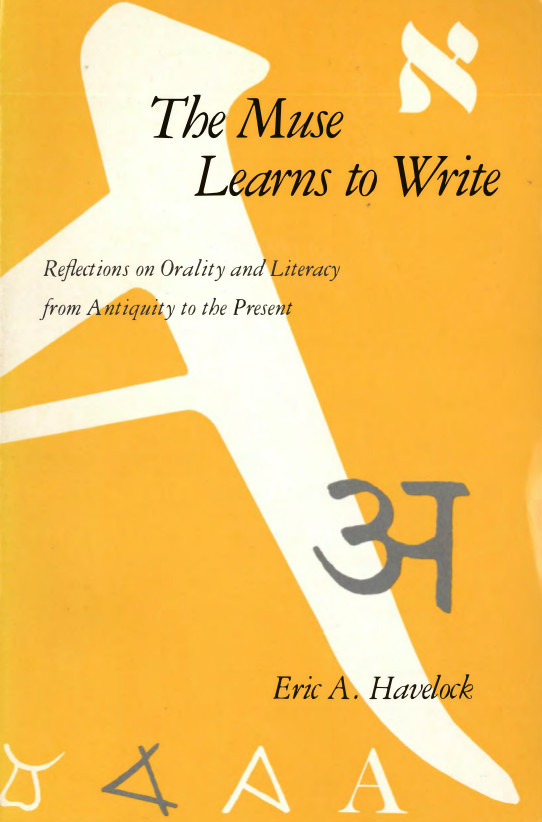Eric A. Havelock: The Muse Learns to Write: Reflections on Orality and Literacy from Antiquity to the Present (1986–) [EN, ES]
Filed under book | Tags: · greece, literacy, orality, rhetoric, writing

“When oral culture becomes literate, in what way does human consciousness itself change? And how does the new form of communication affect the content and meaning of texts? In this book, one of the most original and penetrating thinkers in Greek studies describes the transformation from orality to literacy in classical times and reflects upon its continued meaning for us today.”
Publisher Yale University Press, 1986
ISBN 0300037414, 9780300037418
144 pages
via x
Reviews: Richard Leo Enos (Rhetoric Society Quarterly 1987), T. J. Winnifrith (Classical Review 1988), Elizabeth Duke (Phil & Lit 1990), J.M. Foley (Choice, n.d.).
The Muse Learns to Write (English, 8 MB)
La musa aprende e escribir (Spanish, trans. Luis Bredlow Wenda, 1996, 3 MB)
Computational Culture, 5: Rhetoric and Computation (2016)
Filed under journal | Tags: · algorithm, code, computation, language, machine, philosophy, rhetoric, semantics, software studies, theory
“How can machines be rhetorical? The readers of Computational Culture need not be convinced that computation drives the digital and networked spaces in which we interact, argue and communicate: word processing programs, videogames, banking and commerce systems, social networking sites, and smartphone apps that track our data (both with and without our knowledge) are all evidence that computation in code shapes nearly every space we inhabit. Computation in code affects and effects our lives. Computational machines affect us through their programming and design, as well the discourse they can generate, via text, image, sound, and so on. By writing computer code and software, programmers and designers construct machines that make arguments and judgments and address audiences both machinic and human. In this sense, even the most mundane computational technologies can be seen as rhetorical –from the grocery store check-out scanner to the high school graphing calculator–because any computational machine shapes and constrains behavior. […]
Software studies has paved the way for many disciplines to approach software as an object of study and computer programs as written artifacts, and we may add rhetoric to our toolkit to do so. We can use rhetoric to interpret the ways that computation addresses and responds to various audiences and exigencies, makes assertions about identities, and ultimately participates in a complex ecology of forces that shape behavior and perception. This version of rhetoric is more expansive than the limited, Aristotelian definition rhetoric as the ‘available means of persuasion.’ Just as software studies recognizes that software is more than code, and that code is more than ones and zeros, contemporary rhetoric is interested in more than the content of arguments; it also concerns the relational forces that precede and exceed arguments.” (from the introduction)
With thematic texts by Steve Holmes, John Tinnell, Kevin Brock, Elizabeth Losh, Jennifer Maher, Alexander Monea, Andreas Birkbak & Hjalmar Bang Carlsen, Matthew Bellinger; articles by M. Beatrice Fazi, Erica Robles-Anderson and Patrik Svensson, Michael Lachney, William Babbitt & Ron Eglash, and review section.
Edited by Annette Vee and James J. Brown, Jr.
Published in January 2016
Open Access
ISSN 2047-2390
Roberto González Echevarría: Myth and Archive: A Theory of Latin American Narrative (1990–) [EN, ES]
Filed under book | Tags: · anthropology, archive, christianity, city, history, history of literature, latin america, law, literary theory, literature, myth, narrative, rhetoric, violence, writing

“This book offers a theory about the origin and evolution of the Latin American narrative, and about the emergence of the modern novel. It argues that the novel developed from the discourse of the law in the Spanish Empire during the sixteenth century, while many of the early historical documents concerning the New World assumed the same forms, furnished by the notarial arts. Thus, both the novel and these first Latin American narratives imitated the language of authority. The book explores how the same process is repeated in two key moments in the history of the Latin American narrative. In the nineteenth century, the model was the discourse of scientific travellers such as von Humboldt and Darwin, while in the twentieth century, the discourse of anthropology – the study of language and myth – has come to shape the narrative. Professor González Echevarría’s theoretical approach is drawn from a reading of Carpentier’s Los pasos perdidos, and the book centres on major figures in the tradition such as Columbus, Garcilaso el Inca, Sarmiento, Gallegos, Borges and Garcia Marquez.”
Publisher Cambridge University Press, 1990
ISBN 0521023998, 9780521023993
245 pages
Review (Terry J. Peavler, Latin American Research Review, c1990, EN)
Review (Margarita Zamora, Hispanic Review, 1992, EN)
Review (Adriana Gordillo, Fronteras de la historia, 2003, ES)
Publisher (EN)
WorldCat (EN)
WorldCat (ES)
Myth and Archive (PDF), PDF (English, 1990)
Mito y archivo: una teoría de la narrativa latinoamericana (Spanish, trans. Virginia Aguirre Muñoz, PDF, 77 MB, via Academia.edu)

